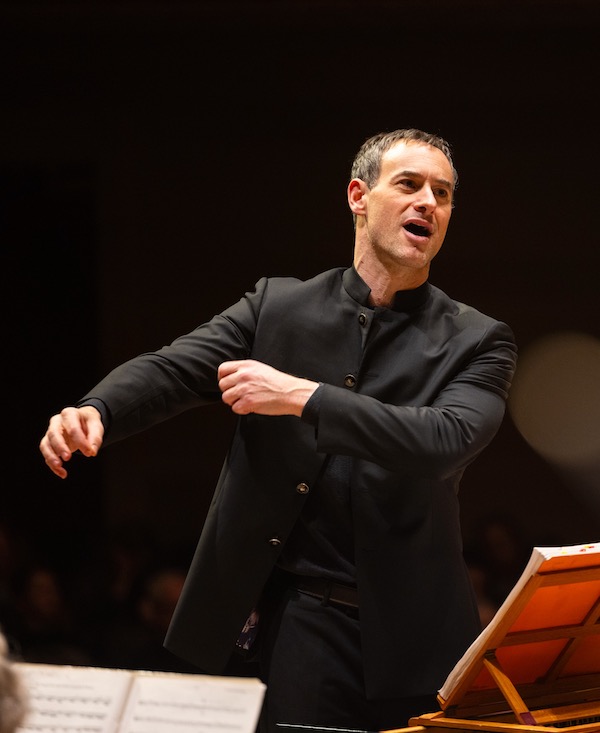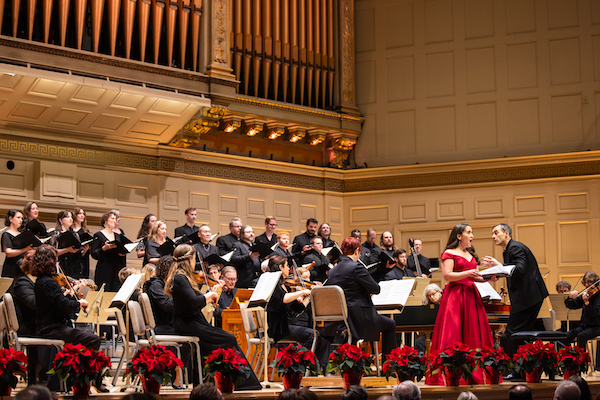Cohen, Handel & Haydn Society bring fresh life, bracing vitality to Handel’s “Messiah”

Jonathan Cohen led the Handel & Haydn Society in its 170th performance of Handel’s Messiah Friday night at Symphony Hall. Photo: Robert Torres
The Handel & Haydn Society wasted no time getting into the spirit of this year’s extra-long Christmas season, returning to Symphony Hall on Friday night for their annual traversal of George Frederic Handel’s oratorio, Messiah.
Handel’s 1742 opus is no stranger either to H&H or Boston: the ensemble has presented the score regularly since 1854. Yet there was nothing rote or stuffy about this latest assaying, the group’s 170th. Rather, on Friday, the old chestnut brimmed with vitality.
H&H artistic director Jonathan Cohen isn’t a man who puts up with dawdling tempos or lackluster phrasings. From the downbeat of the Sinfony, it was clear that his would be a reading steeped in the principles of musical rhetoric, textural clarity, and big dynamic shape. And so the larger performance proved.
Not once in this Messiah–even in its more reflective moments–did the interpretation lose contact with the dancing impetus that underlies so much of Handel’s style. Lilting spots, be they instrumental (like the Pifa), choral (“And the Glory of the Lord”), or soloistic (“O thou that tellest good tidings to Zion”), tripped with complete assurance.
Cohen also drew out various text paintings that dot the score. Orchestral accompaniments to “There were shepherds abiding in the fields” (and its subsequent accompagnatos and recitative) shimmered. The hammering interjections in “He was despised and rejected” bit violently.
The conductor also highlighted unsettlingly queasy dynamic swells at junctures in “Surely He hath borne our griefs” and the closing bars of “All we like sheep.” For sheer intensity, nothing quite topped the laser-like tonal focus of the H&H Chorus at the climax of “Since by man came death.”
That ensemble was the night’s star, delivering their turns with a vocal prowess that was never less than magnificent. Singing with pinpoint diction, faultless tonal blend, and stirring rhythmic energy, the Chorus carried all before it, from the discreet little trill figures in the “Hallelujah” Chorus’s fugal sequence to their wave-like, supremely legato delivery of Messiah’s final chorus.
Most remarkable was Cohen’s ability to tease out and balance all of the choral parts’ busy counterpoint. This is no small accomplishment, especially given the technical and mental challenges of performing this two-and-a-half-hour-long score (given on Friday with cuts). Yet the night’s account of Handel’s choral writing moved with uncommon purpose, spoke with perfect clarity, and, in the process, sounded both unerringly right and viscerally expressive.
Many of those same qualities also marked the contributions of soprano Joélle Harvey, whose silvery instrument floated through Symphony Hall with beguiling effortlessness. Here is a singer who can turn up the power on a dime: the opening of “If God be for us” was gleaming, strong, and clear.
Yet her command of the quiet high notes (like those at the end of that aria), vigorous melismatic runs (like those in “Rejoice greatly”), and tasteful embellishments suggest an artist of great subtlety, flexibility, and imagination. Likewise impressive was tenor Stuart Jackson, who made the most of his handful of solos with fresh, resonant tone and excellent diction.
Countertenor John Holiday brought otherworldly purity to bear on his part. His singing grew in strength as the evening proceeded: the low-tessitura spots that got lost in “But who may abide” emerged readily in “He was despised” and “Thou art gone up on high.”
While bass-baritone José Coca Loza showed an impressive technique–he had all his part’s notes, rhythms, and texts well in hand–his singing was undermined by a lack of vocal presence and volume.
The H&H Orchestra anchored the night’s proceedings with élan. Messiah’s several prominent instrumental solos–particularly those from concertmaster Aisslinn Nosky, principal trumpet Perry Sutton, and principal oboe Debra Nagy–sang with spirit.
Organist Ian Watson provided the continuo a solid foundation, sometimes doing double-duty playing harpsichord with Cohen (who conducted from his own keyboard). Also, timpanist Jonathan Hess’s brief appearances at the ends of Parts 2 and 3 resonated with festive brilliance.
The Handel & Haydn Society performs Handel’s Messiah at 3 p.m. Saturday and Sunday at Symphony Hall. handelandhaydn.org
Posted in Performances

Posted Nov 27, 2023 at 11:35 am by Peter Gibson
In addition to well-deserved compliments for a splendid performance, Jonathan Cohen gets a less welcome accolade: for the first time since Thomas Dunn came to Boston, and in Mr. Cohen’s very first year as Artistic Director, Handel and Haydn has presented a Messiah with cuts. And not minor ones: Four choruses, two recitatives, a duet, and the da capo of “The Trumpet Shall Sound”.
If there was a historical rationale for this, it wasn’t obvious or explained anywhere. What is obvious is that the power and beauty of Messiah are compromised when it isn’t performed in its entirety. When the organization performing it prides itself in being true to the composer’s intentions (not to mention claiming the composer as a namesake) the compromising becomes painfully ironic.